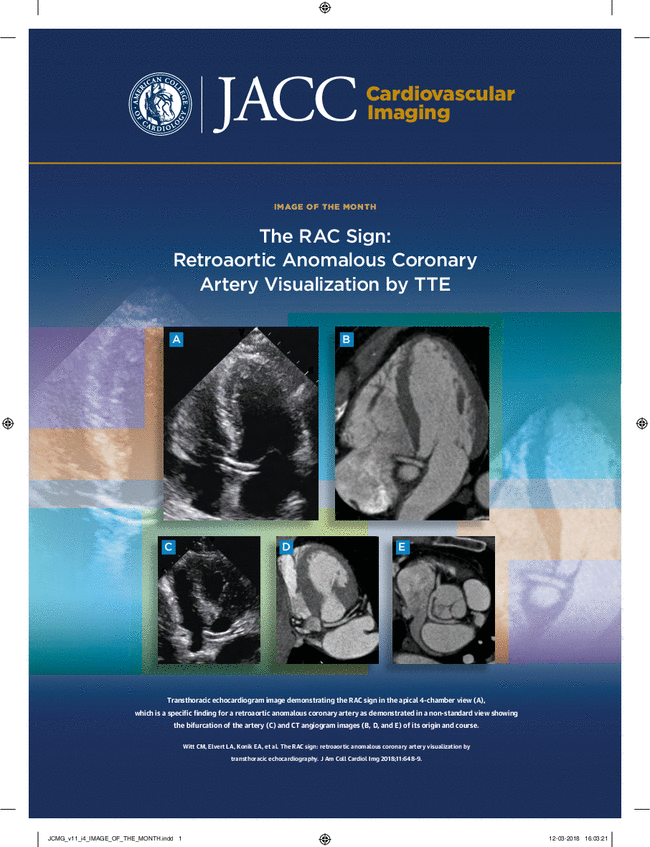Guiding Automated Implementation Strategies for Patients With Atherosclerotic Plaque on Coronary Computed Tomographic Angiography
IF 15.2
1区 医学
Q1 CARDIAC & CARDIOVASCULAR SYSTEMS
引用次数: 0
Abstract
Background
Approximately half of the patients with abnormal findings have no minimal changes in clinical management after stress testing.
Objectives
The primary aim of this study is to assess changes in preventive and anti-ischemic care for stable patients with atherosclerotic plaque on coronary computed tomographic angiography (CTA).
Methods
Projected enrollment is 20,000 patients (∼40 sites) who underwent diagnostic testing for suspected or known coronary artery disease. Changes in medical therapy (dosing and type) and coronary revascularization will be collected through an automated electronic health record data extraction through 1 year of follow-up. In select subgroups, artificial intelligence–enabled quantitative measures of coronary atherosclerotic plaque (QCPA) will be provided promptly or delayed by 90 days, such that prompt decisions guided by coronary artery disease stenosis alone can be compared with QCPA-guided treatment.
Results
A total of 6 care pathways will be evaluated: 1) no QCPA is provided (usual testing); 2) QCPA is provided but delayed and subsequently incorporated into a revised final report to guide patient management; 3) immediate QCPA is provided in nonrevascularized patients; 4) immediate QCPA is provided to patients with prior stenting in 1 vessel; 5) immediate QCPA is provided to asymptomatic patients referred for coronary CTA; and 6) patients referred to stress testing with no coronary CTA (ie, the comparator).
Conclusions
The DECIDE (DErived Plaque Quantification: CCTA and AI-QCPA for Determining Effective CAD management) study will enroll and characterize a broad spectrum of patients who require initiation and intensification of preventive care. The authors will use efficient and automated systems to evaluate the impact of quantitative atherosclerotic plaque measurement on preventive care that will help guide implementation strategies to improve outcomes for patients undergoing coronary CTA.
指导冠状动脉ct血管造影中动脉粥样硬化斑块患者的自动化实施策略:人工智能- decision研究的原理和设计。
背景:大约一半有异常发现的患者在压力测试后的临床处理没有轻微的变化。目的:本研究的主要目的是评估稳定的冠状动脉ct血管造影(CTA)患者动脉粥样硬化斑块的预防和抗缺血护理的变化。方法预计纳入20,000例(约40个地点)接受疑似或已知冠状动脉疾病诊断测试的患者。通过1年的随访,通过自动电子健康记录数据提取收集药物治疗(剂量和类型)和冠状动脉血运重建的变化。在选定的亚组中,人工智能支持的冠状动脉粥样硬化斑块(QCPA)定量测量将及时或延迟90天提供,以便单独由冠状动脉疾病狭窄指导的快速决策可以与QCPA指导的治疗进行比较。结果共评估6个护理通路:1)未提供QCPA(常规检测);2)提供QCPA,但被推迟,随后纳入修订后的最终报告,以指导患者管理;3)对非血运重建患者提供即时QCPA;4)对1支血管置入患者提供即时QCPA;5)对转诊行冠状动脉CTA的无症状患者提供即时QCPA;6)患者在没有冠状动脉CTA(即比较器)的情况下进行压力测试。结论:DECIDE(衍生斑块量化:CCTA和AI-QCPA用于确定有效的CAD管理)研究将招募并描述需要开始和加强预防性护理的广泛患者。作者将使用高效和自动化的系统来评估定量动脉粥样硬化斑块测量对预防保健的影响,这将有助于指导实施策略,以改善接受冠状动脉CTA的患者的预后。
本文章由计算机程序翻译,如有差异,请以英文原文为准。
求助全文
约1分钟内获得全文
求助全文
来源期刊

JACC. Cardiovascular imaging
CARDIAC & CARDIOVASCULAR SYSTEMS-RADIOLOGY, NUCLEAR MEDICINE & MEDICAL IMAGING
CiteScore
24.90
自引率
5.70%
发文量
330
审稿时长
4-8 weeks
期刊介绍:
JACC: Cardiovascular Imaging, part of the prestigious Journal of the American College of Cardiology (JACC) family, offers readers a comprehensive perspective on all aspects of cardiovascular imaging. This specialist journal covers original clinical research on both non-invasive and invasive imaging techniques, including echocardiography, CT, CMR, nuclear, optical imaging, and cine-angiography.
JACC. Cardiovascular imaging highlights advances in basic science and molecular imaging that are expected to significantly impact clinical practice in the next decade. This influence encompasses improvements in diagnostic performance, enhanced understanding of the pathogenetic basis of diseases, and advancements in therapy.
In addition to cutting-edge research,the content of JACC: Cardiovascular Imaging emphasizes practical aspects for the practicing cardiologist, including advocacy and practice management.The journal also features state-of-the-art reviews, ensuring a well-rounded and insightful resource for professionals in the field of cardiovascular imaging.
 求助内容:
求助内容: 应助结果提醒方式:
应助结果提醒方式:


